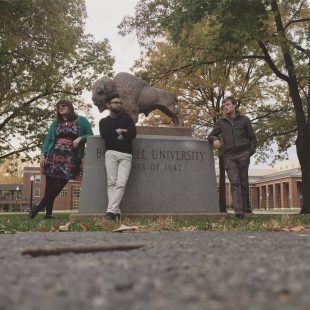
It’s been just over a week since I went to my first academic conference (!) and I’m ready to share my experience. I went to BUDSC 16 over the weekend of October 28 – 30th with Mackenzie and Brandon.
The Bucknell University Digital Scholarship Conference, is held at Bucknell University (duh) in Lewisburg, Pennsylvania every year. This year, Mackenzie and Brandon graciously inserted me into their presentation about writing in the context of digital scholarship and digital humanities. More on that later. Overall, the conference was an extremely interesting and enlightening experience. It was also a lot of fun and I’m thankful that my professors/supervisors are great people to go road tripping with. Besides the endless icebreakers and a wrong turn in Pennsylvania, there was a lot to take in during the days of the conference. Here’s a brief rundown of what I participated in during the conference:
- Arrived on Friday night, too late for conference activities, so we got dinner and prepared for Saturday.
- Saturday morning: I attended a panel about “Reframing Art History Through Digital Approaches.” To me, it was pretty classic DH work. The panel included presentations by Bucknell University Art History students who explored collections in the Packwood House museum in Lewisburg and used Omeka to archive the most interesting collections, and a presentation about digital tools and using them for pedagogy, specifically for art history and teaching resources for art history.
- After a break, Mackenzie and I went to panel called “Re-Envisioning and Reclaiming History”. This one started off with a great exhibition of a project from Middlebury College. You can watch it for yourself at collinwoodfire.org. It was an incredible multimedia website with an animated movie, newspaper articles, photographs, and other archival data to present the history of the Collinwood School fire in 1908. I highly recommend you check it out, especially the video. The latter half of the presentation was about using digital scholarship in the humanities to engage various audiences outside of academic environments.
- The conference picked up for me at lunch. Safiya U. Noble, a professor at UCLA, gave the keynote address about “Power, Privilege, and the Imperative to Act in the Digital Age.” Her talk had to do with how digital applications and technology can perpetuate negative stereotypes and serve to reinforce oppressive ideology and history. Professor Noble brought up Google’s search results, the human and environmental impacts of the latest iPhone, and the sustainability of a programmer’s code. Everything was thought-provoking and made a lot of sense to me. It wasn’t necessarily enjoyable to listen to, but it was definitely something that many people needed to hear.
- Next, Brandon and I went to a workshop that introduced visualizing data on social media such as Instagram and Twitter using websites such as Netlytics and Socioviz. Good to know if I intend to do any data mining for a future project.
- Our presentation! The other two presentations before ours were also about the role of “Digital Scholarship in Higher Education.” Brandon and Mackenzie discussed and presented the uses of writing as a digital humanities method. Writing for the digital humanities, such as for blogs or to communicate in public (much like how I’m doing now) is very different from writing for an academic setting. I spoke for a bit about my perspective on how DH writing and blogging are different from writing that I’ve done for essays and/or literary analyses in my classes. I also discussed my honors thesis and how I’ll be incorporating DH writing into the notion of a traditional thesis.
- Cocktail hour – students and professors presented about their various projects with posters and Powerpoints over hors d’oeuvres. I had the pleasure of meeting students from Lafayette College and their professor, and their presentations. And that was it for Saturday.
- Sunday morning was almost as eye-opening as Professor Noble’s keynote. The first presentation was a little different from the two after. Dr. Heil presented about the pedagogy of large-scale digital scholarship. The next two were more about using digital scholarship to break down borders (the theme of the conference) in ways that may not be obvious. Sandra Nelson discussed the inherent phallogocentricity of programming and coding languages, while Emily McGinn talked about the Western and English-dominated aspects of digital scholarship.
Overall, BUDSC 16 was a worthwhile trip and a great opportunity for me. I thought my part of the presentation would be a bigger part of it for me, but the rest of what I learned and observed was much more valuable than a few minutes of speaking time. There are a couple more conferences this year that I might have the pleasure of attending, and presenting at, and I’m looking forward to them.